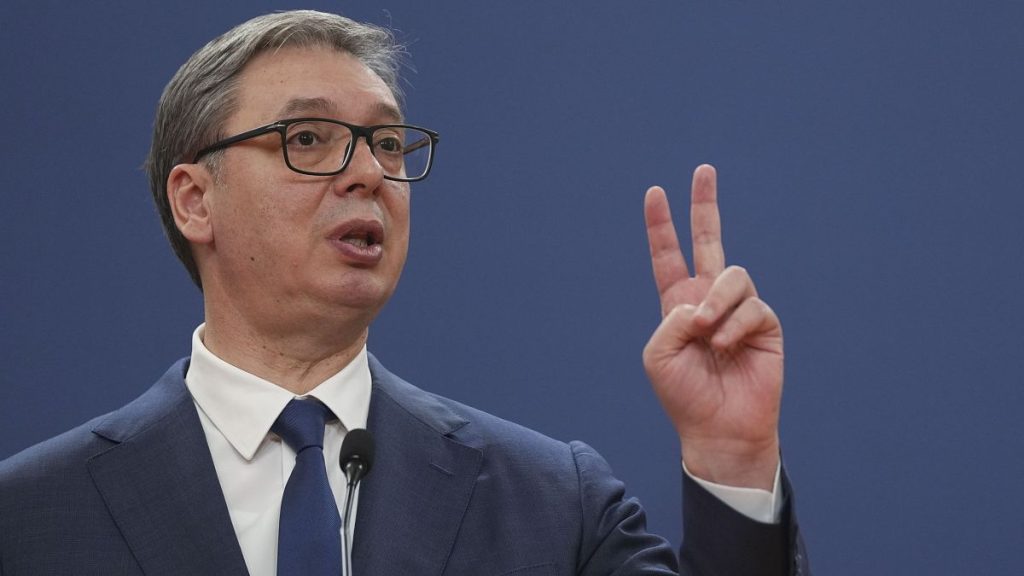The United States has imposed sanctions on NIS, Serbia’s largest oil and gas company, due to its ownership ties with Russia’s state-owned energy giant, Gazprom. This move signals a significant escalation in pressure on Serbia, a nation traditionally aligned with Russia, to distance itself from Moscow amidst the ongoing geopolitical tensions surrounding the war in Ukraine. The sanctions, details of which are expected to be fully disclosed in a joint press conference between Serbian and US officials, are reported to demand the complete removal of Gazprom’s stake in NIS, rather than a mere reduction. This stringent requirement puts Serbia in a difficult position, forcing it to choose between maintaining its economic relationship with Russia and aligning with the West, particularly the US. Serbian President Aleksandar Vučić has announced his intention to hold talks with Russian President Vladimir Putin following the announcement of the sanctions, likely to discuss potential solutions to the complex situation.
The US sanctions on NIS represent a substantial challenge to Serbia’s energy security and economic stability. NIS has played a crucial role in Serbia’s energy sector, providing a significant portion of the country’s oil and gas needs. The company’s close ties with Gazprom have historically ensured a reliable and relatively affordable energy supply for Serbia, giving it a competitive advantage compared to other nations in the region. The forced divestiture of Gazprom’s stake in NIS disrupts this established energy relationship and introduces considerable uncertainty into Serbia’s energy future. The country will now face the challenge of securing alternative energy sources, potentially at higher costs, and navigating the complexities of restructuring NIS’s ownership.
President Vučić’s statement that the US demands a “complete exit” of Gazprom from NIS highlights the seriousness of the situation. The rejection of even a partial Russian ownership stake indicates a firm stance by the US to sever economic ties between Serbia and Russia, aiming to further isolate Moscow economically and politically. This demand places Serbia in a precarious position, caught between its long-standing relationship with Russia and the increasing pressure to align with the West. The upcoming talks between Vučić and Putin are expected to address the implications of the sanctions and explore potential solutions, including the possibility of Serbia purchasing Gazprom’s stake in NIS. However, such a move could be fraught with its own challenges, including securing the necessary financing and navigating potential political ramifications.
The possibility of Serbia buying out Gazprom’s share in NIS presents a complex scenario with both potential benefits and significant drawbacks. On one hand, it would allow Serbia to maintain control over a strategically important national asset and avoid a complete disruption of its energy supply. It could also potentially strengthen Serbia’s position in negotiations with other potential investors or partners in the energy sector. On the other hand, acquiring Gazprom’s stake would represent a substantial financial burden for Serbia, requiring a significant investment at a time of economic uncertainty. Furthermore, such a move could be perceived as defying US sanctions and further strain relations with the West. Serbia would need to carefully weigh the financial and political implications of this option before making a decision.
The timing of these sanctions adds another layer of complexity to the situation. The ongoing war in Ukraine has intensified international pressure on countries with close ties to Russia. The US and its allies have implemented a series of sanctions targeting Russia’s economy and seeking to limit its influence globally. Serbia, while not officially aligned with Russia in the conflict, has maintained close political and economic ties with Moscow, including abstaining from joining Western sanctions against Russia. The sanctions against NIS appear to be a direct consequence of Serbia’s reluctance to fully align with the West on this issue. The situation underscores the increasing pressure on Serbia to choose sides in the escalating geopolitical confrontation between Russia and the West.
The sanctions on NIS represent a pivotal moment in Serbia’s foreign policy and economic trajectory. The country faces a difficult choice between maintaining its historical ties with Russia and aligning with the West, a decision with far-reaching consequences for its future. The outcome of the talks between Vučić and Putin, as well as the details of the sanctions revealed in the upcoming press conference, will be crucial in determining Serbia’s course of action and its long-term relationship with both Russia and the West. The situation highlights the complexities of international relations and the challenges faced by nations caught in the crosshairs of geopolitical power struggles. Serbia’s response to this challenging situation will have significant implications for the stability of the region and the broader geopolitical landscape.














